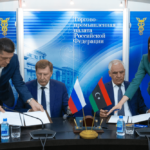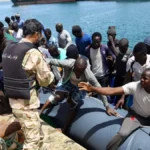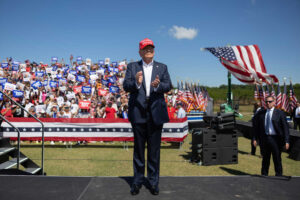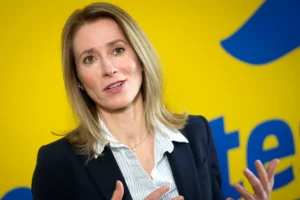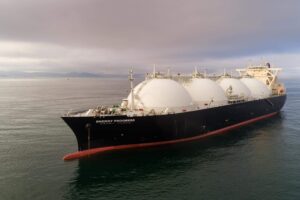Volodymyr Zelenskiy made an emotional appeal to the UK to supply Ukraine with fighter jets on a surprise visit to the UK, forcing Rishi Sunak, previously opposed to handing over UK jets, to order a defence ministry review into whether Zelenskiy’s request can be met.
In a historic address to members of the Commons and the Lords at Westminster Hall, Zelenskiy made the call in a speech lavishing praise on Britain’s leadership in the world, and was immediately backed by Zelenskiy’s firmest British ally, Boris Johnson.
The former prime minister said: “It is time to give Ukraine the extra equipment they need to defeat Putin and bring peace to Ukraine.’’ He said “the best single use of the 100 Typhoon planes in the UK’s possession is to deploy them now for the protection of Ukraine”, adding, “the faster we do it the better”.
At a joint press conference with Zelenskiy after reviewing the training of Ukrainian troops on a Challenger 2 tank simulator in Dorset, Sunak said “nothing was off the table”. The prime minister said the UK provision of planes was “part of the conversation” but that the very immediate need was for longer-range missiles and tanks, something the UK was providing and showing global leadership.
Denying there was any reticence, Sunak said it may take as long as three years to train the pilots to use UK jets. He noted there were supply chain issues, adding that some of the UK aircraft are linked to joint treaties with other countries. Forced on the defensive, he said the UK had been the most forward leading-edge country in supplying arms, and had broken the logjam on tanks by providing the Challenger 2s.
Zelenskiy – while repeatedly expressing his gratitude to the UK – also shot back at a suggestion by Sunak that it might take a pilot three years to be trained on a Typhoon saying: “You know, come on, we will be sending you pilots who have already trained for two and a half years.”
He added if Ukraine was not provided with the weapons and ammunition it needed, “there will be stagnation and these people will be living on our territory and they will be a great risk to the world”. He said Russia showed no pity for its own people and just threw them on to the battlefield.
Only a week ago Sunak ruled out providing UK jets such as Typhoons, on the grounds that it was impractical since Ukrainian pilots would need as long as five years to be trained to operate them.
Instead, as Zelenskiy touched down at Stansted airport on Wednesday morning, Sunak announced Britain was only making a different long-term offer on fighter jets, saying the UK would be “expanding its training offer to include fighter jet pilots to ensure Ukraine can defend its skies well into the future”.
Downing Street said: “The training will ensure pilots are able to fly sophisticated Nato standard fighter jets in the future.” Sunak added: “The first step in being able to provide advanced aircrafts is to have soldiers or aviators that are capable of using them. That is a process. It takes some time, we’ve started that process today.”
The US Congress announced last summer it had set aside $100m (£83m) to train Ukrainian pilots on F-16s, but Sunak’s training offer came after the debate had been revived on whether Nato should follow the provision of tanks by supplying Ukraine with aircraft.
The proposal appeared to be intended to nudge the UK’s Nato allies to hand over its planes, mainly F-16s. Until now Ukraine’s air force had been seeking US-made F-16s jets or perhaps Sweden’s Gripen as the kind of combat aircraft that could help it win the near year-long war.
The RAF uses neither, and has 146 Typhoons out of an estimated 580 worldwide. But the fighter is available in far smaller numbers than the F-16 and the involvement of Germany as a manufacturer may make export to Ukraine complex, given Berlin’s hesitancy over tanks. Olaf Scholz, the German chancellor, has become increasingly irritated by the competition to supply arms and fears Germany taking steps that provoke a Russian escalation.
The other fighter Britain uses, the F-35, is made by Lockheed Martin of the US, and so any re-export decision would rest with Washington. It is so new and so expensive, it would simply be not as cost-effective as the F-16.
Zelenskiy was due to press the fighter jet issue further in Paris when on Wednesday night he held talks with the French president, Emmanuel Macron, and Scholz ahead of a meeting with all 27 EU heads of government in Brussels.
The fighter jet controversy was forced into prominence, and ultimately came to dominate a day of ceremony and deep emotions. Zelenskiy in his speech to parliamentarians in Westminster Hall drove home his request with typical showmanship by giving Lindsay Hoyle, the Commons speaker, the gift of a helmet of an ace Ukrainian fighter pilot on which a handwritten request read: “We have freedom, give us wings to protect it.”
Zelenskiy pointed out King Charles – whom he was to meet later at Buckingham Palace – had himself been a pilot, adding “in Ukraine every pilot was a king”. Deploying humour as well as urgency, he finished his speech with the words: “Leaving the British parliament two years ago, I thanked you for delicious English tea, and I will be leaving the parliament today thanking all of you in advance for powerful English planes.”
His speech constantly evoked Britain’s grit in the second world war and the stakes for Europe in this war, and was greeted with enthusiastic cheers from both MPs and peers across all parties.
Zelenskiy is one of a small group of world leaders who have given speeches at parliament’s oldest building, including Charles de Gaulle, Nelson Mandela and Barack Obama. The Ukrainian president – his visit kept under wraps until the last minute – was received rapturously by the hundreds of MPs, peers, parliamentary staff and media assembled in the historic hall.
Applause began as soon as he emerged through a side entrance and was escorted to a raised lectern at the front of the hall, and parliamentarians repeatedly interrupted the half-hour address with further clapping. Most MPs were gathered standing at the front of the 11th-century wooden-roofed structure, the oldest part of the parliamentary estate, while others crammed on to stairways to get a glimpse.
“Ladies and gentlemen, I thank you for your bravery,” Zelenskiy said. “London has stood with Kyiv since day one, from the first seconds and minutes of the full-scale war.”
Referring to the second world war, he said: “The horizon never stays clear for a while. Once the old evil is defeated, a new one is attempting to raise its head.”
The Ukrainian president’s visit, less than a fortnight before the anniversary of the Russian assault on Kyiv, was only the second time he has left his country since the outbreak of war a year ago, following a visit to Washington in December.
He was introduced by Hoyle, who told him: “We are honoured you put yourself at risk to address us and again shine a light on the fact your country is still fighting for its survival.”
Earlier, Zelenskiy spoke to Sunak in No 10, where he said the two had a “very good relationship”. In a break from protocol, staff in Downing Street greeted the president with applause when he entered No 10.
source; the guardian

